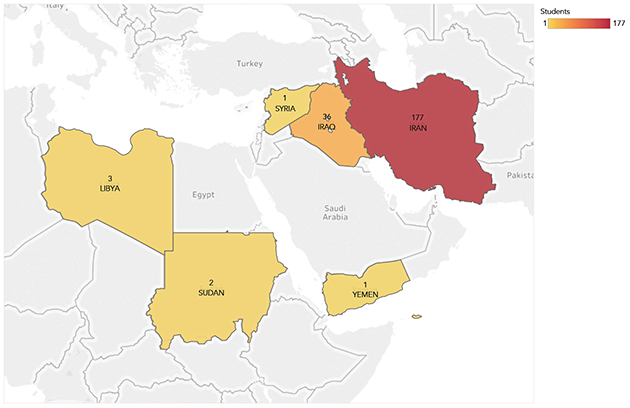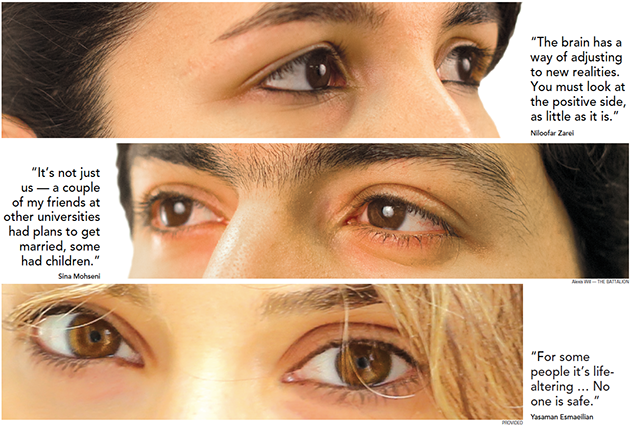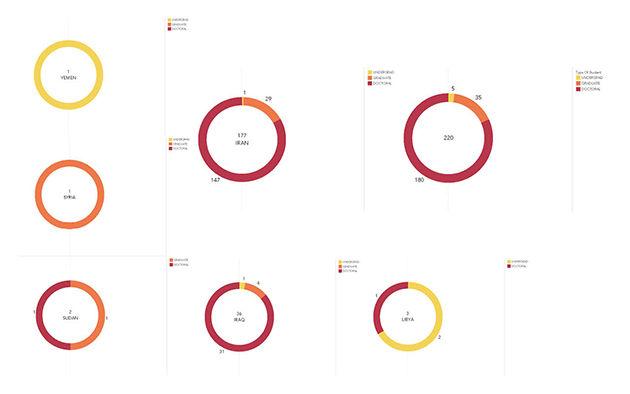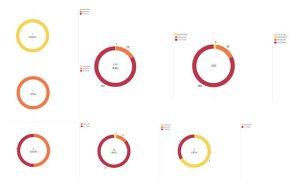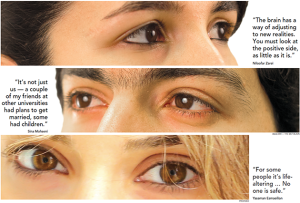The last time Shabnam Daghaghi saw her parents was in an airport more than two years ago when she came to the United States from Iran to get her Ph.D. in electrical engineering at Texas A&M.
“You know, I didn’t have enough time to make it more of a goodbye with them,” Daghaghi said. “I was really in a hurry and I couldn’t actually hug them the way I should have. I think about that all the time — how I didn’t have enough time to be with them.”
According to the Data and Research Services enrollment profile for fall 2016, more than 200 international students at A&M are from countries affected by President Donald Trump’s Jan. 27 Immigration Ban, which blocked citizens from Iran, Iraq, Syria, Libya, Somalia, Yemen and Sudan from coming to the United States for 90 days, even with valid visas. Daghaghi is one of them.
On Friday, a federal judge in Seattle put a nationwide block on Trump’s executive order, which permitted travel to resume. The Justice Department appealed the decision Saturday and requested that the ban be restored immediately, but early Sunday morning the federal appeals court rejected the appeal. The Trump administration’s reply is due Monday, according to the United States Court of Appeals for the Ninth Circuit in San Francisco.
Despite the ban being lifted for the time being, ambiguity remains about what will happen next. With uncertainty looming, A&M international students like Daghaghi who have been affected by the Immigration Ban are trying to continue their lives despite the confusion and developing situations.
During the two years Daghaghi has been in the United States, she was confident in her decision to study in the country and was looking forward to seeing her parents soon. Then she found out about the executive order.
“I couldn’t focus on my research — I couldn’t do anything,” Daghaghi said. “I’m just thinking maybe I made a mistake to choose this country. I really love this country, the people. But maybe I made a mistake.”
Daghaghi has several friends at A&M, and she said while she’s thankful to have them as a support system, she still misses her parents.
“Thank God I could have many friends,” Daghaghi said. “We have the same problem; we have the same pain. But nothing is comparable with our families. Nothing can replace them.”
Ahad Esmaeilian came to A&M from Iran in 2012 to pursue his Ph.D. in electrical engineering. His wife Yasaman joined him in December 2014 after she finished her medical degree in Iran. Ahad has his green card and is considered a “National Interest” due to his extensive research and recognition for his work, and Yasaman has an Employment Authorization
Document (EAD) card, which gives non-citizens temporary employment authorization.
Yasaman secured 33 interviews with top residency programs all over the country, but Ahad said program directors may not rank her due to the unpredictability surrounding the executive order. Additionally, her EAD card expires in May and programs begin in June. Even if she were to secure a ranking at one of the programs, the executive order, if restored, would prohibit her from extending her EAD to allow her to begin one of the programs, Ahad said.
Despite the ambiguity of the future, Ahad said he and his wife are trying to stay positive.
“For us, it’s really important but I think if something happens to me, if I can’t get into residency this year, it’s still fine,” Yasaman said. “We’re together, he has a green card, we can do something. He can work, I can stay at home. And if it’s just one year, it’s okay. But for some people it’s life-altering … No one is safe.”
Ahad said part of staying positive includes trying not to worry his family back home in Iran.
“Every time I talk to my mom, and my brothers and sisters, I tell them every time, I just say, ‘Everything is okay. We are good, I have a green card so you don’t need to worry. Other people are being affected, but not us,’” Ahad said. “I know that she is the kind of person who cannot sleep at night if she knows something is wrong.”
Niloofar Zarei, a Ph.D. student from Iran, hasn’t seen her parents since the fall of 2015. Her parents obtained a visitor visa to visit her and her husband-to-be in mid-February, but the executive order brought both the visitation and wedding plans to a screeching halt.
“The brain has a way of adjusting to new realities. You must look at the positive side, as little as it is,” Zarei said. “Sometimes I think we may not be the worst case. There are people who went home for Christmas to visit their family and they were planning on coming back to continue their studies and they can’t. Many of us work part time for the university as research assistants, [teaching assistants], and those are commitments you can’t ignore.”
Zarei’s fiancé, Sina Mohseni, said the executive order didn’t provide any notice for people who were in the middle of traveling when it went into effect.
“I can’t tell you how hard it is for someone who’s at the airport and they don’t let him or her in, and they just say, ‘Go back,’” Mohseni said. “All the plans — it’s not just us — a couple of my friends at other universities had plans to get married, some had children — many different situations.”
Daghaghi said she feels there are misconceptions of those who were banned.
“The wrong thing that many people misunderstand is that all people who are banned because of this order are not refugees,” Daghaghi said. “Many of them are just ordinary people — parents, students.”
A&M President Michael Young sent a campus-wide email Jan. 30 offering support and resources for students affected by the ban. Bill Taylor, director of International Student Services, also sent an email to students from the seven affected countries notifying them of counseling resources.
“This can be a stressful time and people deal with stress differently,” Taylor said. “That’s why we encourage the students to seek Student Counseling Services if they’re feeling stressed because of the situation.”
On Friday, presidents from 598 colleges and universities across the country, including Young, sent a letter to Secretary of Homeland Security John F. Kelly expressing the importance of international students and exchange programs to universities.
“Our nation can only maintain its global significance and economic leadership position if it encourages those talented people to come here to study and work,” the letter reads.
Rep. Beto O’Rourke (D-TX) met with editors from The Battalion Sunday as part of a visit to A&M. O’Rourke said he’s impressed with the support A&M is offering to international students affected by the ban.
“I’m so proud that the university is signing on to [the letter sent to Secretary of Homeland Security] and is able to articulate the strength that immigrants bring to institutions like this one and also just to the country and who we are,” O’Rourke said.
On Jan. 30, hundreds of A&M students flooded Rudder Plaza for a protest aimed at denouncing the executive order and making international students affected by the ban feel welcome on campus.
Ahad said while his and Jasmine’s situation is difficult, he feels grateful for the support they’ve received.
“I could have studied here and gone back home,” Ahad said. “But I see these things, and I decide to stay … I try to make some contribution on my studies and on my research, so I can be recognized as a National Interest so I can get my green card. Because I realize that this is the place that I want to be — this is where I want to raise my children.”
Daghaghi said despite the uncertainty, she and her parents still have hope they will see each other soon.
“I actually still have hope that I can see my parents, but right now it feels like a jail,” Daghaghi said. “We still have hope … And my parents actually have not canceled their tickets yet.”
After the ban was lifted over the weekend, Zarei’s mother immediately boarded a plane to see her daughter while she could.
“Once [the ban was lifted] the airlines started taking passengers from the seven banned countries and I got a ticket for my mom,” Zarei said. “This was not possible without the thousands of Americans protesting for our rights and I am very, very grateful to everyone that has a part in any protest.”
Zarei said she’d encourage people with stories similar to hers to be patient.
“There’s nothing we can do,” Zarei said. “We can just tell our experience, say what we’re going through, and hope that people will understand. There’s safety for Americans, and that’s their right. But the way the law is being enforced is causing a lot of people to suffer. Maybe there’s a better way.”
Editor’s Note: This story is developing. The Battalion will update the article online as more information becomes available.
Eyes on Washington: Students affected by Immigration Ban work through uncertain future of executive order
February 5, 2017
Photo by Graphic by Olivia Adam
A representation of the number of A&M international students from each of the seven countries affected by the Immigration Ban. Data via fall 2016 enrollment profile.
0
Donate to The Battalion
$2065
$5000
Contributed
Our Goal
Your donation will support the student journalists of Texas A&M University - College Station. Your contribution will allow us to purchase equipment and cover our annual website hosting costs, in addition to paying freelance staffers for their work, travel costs for coverage and more!
More to Discover




